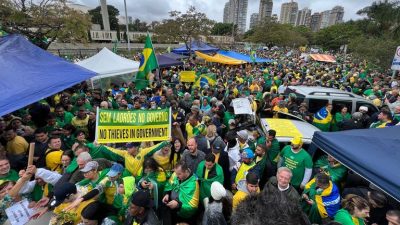Political Polarization in Brazil Reaching Point of No Return

All Global Research articles can be read in 51 languages by activating the Translate Website button below the author’s name.
To receive Global Research’s Daily Newsletter (selected articles), click here.
Follow us on Instagram and Twitter and subscribe to our Telegram Channel. Feel free to repost and share widely Global Research articles.
***
The days following Lula’s victory are being marked by protests across Brazil. People took to the streets to express disapproval against the election of the leftist candidate and demand intervention by the military. Boycotts to the national economy are being operated by groups linked to agribusiness, such as truck drivers involved in the transport of agricultural goods. Bolsonaro’s supporters believe the elections were manipulated and expect the process to be entirely annulled.
Political tensions in Brazil are increasing day by day. The reaction of Bolsonaro voters quickly escaped the control of the authorities. Truck drivers began to occupy the country’s key highways, preventing the supply of large cities. Then, the main capitals began to have their streets filled with crowds wearing shirts with the colors of the Brazilian flag, who, singing the national anthem and making patriotic salutes, demand that Lula’s election be revoked.
On November 2, the situation began to get even more tense. Due to the fact that it is a national holiday, an even greater number of people attended the protests. The focus became the concentration of masses in front of the main military units of the country. Protesters are calling for intervention by the armed forces to reverse the election result or take control over the government.
In fact, the demonstrations were favored by Bolsonaro’s inertia in the face of his defeat. The incumbent president ignored the Brazilian tradition according to which the defeated presidential candidate must call the winner immediately after the announcement of the result, to congratulate him. Bolsonaro not only remained silent for two days, but he also went public on November 1 to say that he would not congratulate Lula, which further exacerbated political polarization among voters.
Faced with the pro-Bolsonaro escalation and the absence of effective actions by the authorities to regain control over the multitudes, social life began to be affected. The main universities in the country suspended their activities, as well as several institutions located in rural areas, which are the most affected by the occupation of roads promoted by truck drivers. In response, social movements linked to Lula’s Party, such as the MTST (an organization of homeless workers), began a call for their militants to “liberate” the roads, acting as true parallel militias.
Mutual violence began to take on worrying contours after an attack by a pro-Lula driver in the city of Mirassol, São Paulo state. The motorist intentionally drove his car running over at least sixteen pro-Bolsonaro protesters, injuring even women and children. Other acts of violence have been reported in many regions, pointing to a pre-civil conflict scenario in Brazil.
Due to the chaos, Brazil took the news around the world, becoming a trending topic on social networks. Unsubstantiated rumors about possible military moves to annul the elections or operate a coup d’état began to circulate on the internet, generating even more collective anxiety and friction among Brazilian citizens. Bolsonaro went public again on November 2 to ask truck drivers to liberate the roads, in order to guarantee supply to the cities. However, he stressed the importance of continuing the protests peacefully.
Indeed, the problem of political polarization in Brazil is not something new. Experts have commented on this topic for a long time and warned of serious consequences if social pacification is not achieved quickly. During the electoral campaign there were several episodes of explicit violence, including murders, on both sides. This type of scenario intensifies the ideological tendencies of the population and prevents any kind of rational analysis of the country’s political status quo.
In fact, for decades Brazil has had its domestic arena dominated by wings that correspond to the interests of foreign elites. On the one hand, liberal conservatives, pro-Republicans and radical Zionists; on the other, progressives, environmentalists and pro-Democrats. Bolsonaro represents the first group – not by chance, having received support from Trump and Netanyahu in 2018 -, while Lula represents the second one – which is why he is now endorsed by the EU, Soros-backed NGOs, and Biden’s administration.
Both sides serve external interests and do not present concrete proposals for Brazil. Polarization, in this sense, serves precisely to keep the people ideologically inflamed and prevent candidates with projects focused on national development, and not on external alignment, from gaining popularity.
Regardless of what happens with the protests, the polarization will not end now. Certainly, the disruptive hatred among Brazilian voters will continue to intensify in the coming years, as will the popular yearning for the end of regular institutions and for a coup d’état. The Brazilian military seems committed to democracy and ignores calls for intervention made by the rightists. However, if the crisis of legitimacy reaches a point of no return and leads Brazil to absolute chaos, it is possible that a more interventionist political thought will actually begin to penetrate the military circles in the near future.
*
Note to readers: Please click the share buttons above. Follow us on Instagram and Twitter and subscribe to our Telegram Channel. Feel free to repost and share widely Global Research articles.
Lucas Leiroz is a researcher in Social Sciences at the Rural Federal University of Rio de Janeiro; geopolitical consultant. You can follow Lucas on Twitter and Telegram.
Featured image is from InfoBrics

